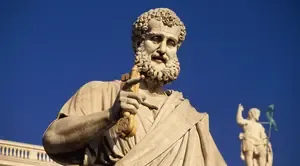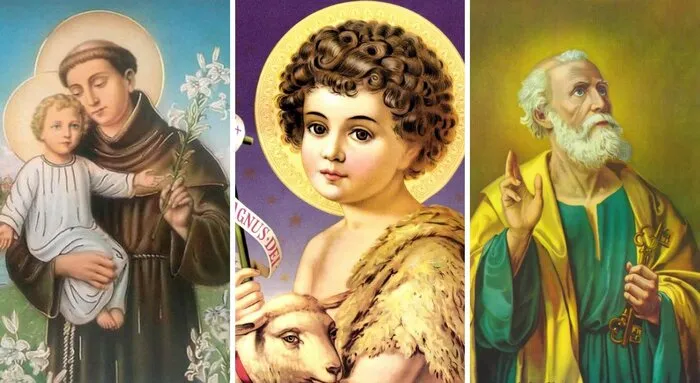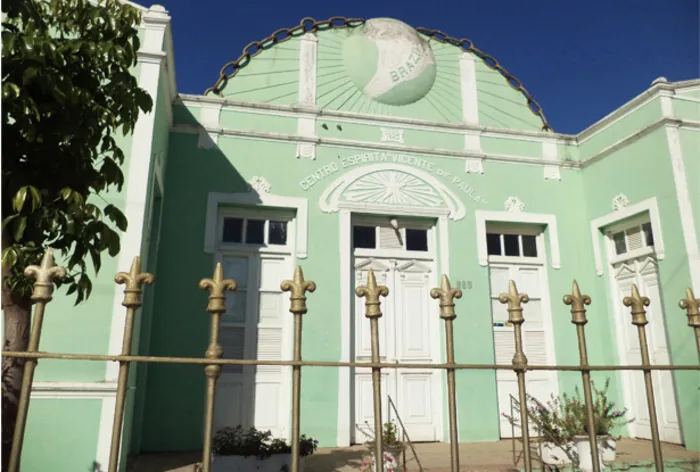June is a very special month for Catholics, because it is marked by the celebration of three important saints: Saint Anthony, Saint John and Saint Peter. These saints are admired for their lives of faith, their miracles and their contributions to the Church.
Adverts
Their stories are deeply rooted in Catholic tradition and celebrated with fervor in diverse cultures and regions. Each of them has a rich and meaningful story that continues to inspire and strengthen the faith of millions of people around the world.
The festivities in honor of these saints, known as June festivals, are moments of joy, devotion and spiritual reflection. In this article, we will explore the lives and importance of each of these saints, highlighting their major achievements and legacies.
Let's delve into the stories of Saint Anthony, the protector of the poor and of marriages; of Saint John the Baptist, the precursor of Christ; and Saint Peter, the first Pope and cornerstone of the Church.
Saint Anthony: The Saint Matchmaker
Saint Anthony of Padua, also known as Saint Anthony of Lisbon, was born in Lisbon, Portugal, in 1195. He is widely known as the “Saint Matchmaker” due to his reputation for interceding on behalf of those seeking a good marriage.
Saint Anthony joined the Franciscan order and dedicated his life to preaching and teaching. He is famous for his eloquent sermons and his deep understanding of Scripture. His love for the poor and his dedication to social justice are also defining aspects of his life.
Antônio was known for his ability to communicate complex messages in a simple and accessible way, deeply touching the hearts of the faithful. His life was an example of humility and service. He gave up riches and comfort to live among those in need, helping them not only spiritually but also practically.
Saint Anthony was canonized just one year after his death, in 1232, due to the countless miracles attributed to his intercession. His devotion and the miracles he performed continue to inspire millions of people around the world.
The Miracles of Saint Anthony
Saint Anthony is remembered for many miracles, including the famous “Miracle of Bread”. It is said that he once distributed bread to the poor during a great famine, and the bread miraculously multiplied.
Another notable miracle is that of preaching to the fish, where he, after being rejected by men, preached to the fish who gathered to hear him.
Devotion to Saint Anthony is strong in many parts of the world, especially in Portugal, Brazil and Italy. His images are often seen in Catholic homes, and many people turn to him for help finding lost objects, another aspect of his fame.
Saint John: The Forerunner of Christ
Saint John the Baptist, known as the Precursor, is celebrated on June 24th. He is a central figure in Christianity, recognized for having baptized Jesus Christ and for his fervent preaching about repentance and preparation for the coming of the Messiah.
John was born to elderly parents, Zechariah and Elizabeth, and his conception was announced by the angel Gabriel. He lived a life of asceticism in the desert, preaching about the need for repentance and baptizing those who repented of their sins.
John the Baptist is seen as a model of humility and service, as he always pointed to Christ and not to himself.
The Martyrdom of Saint John
The life of Saint John the Baptist culminates in his martyrdom, a deeply significant story in the Christian tradition. He was arrested by Herod Antipas for condemning Herod's illicit marriage to Herodias, his brother's wife.
Herodias, resentful of John, plotted his death. At a party, Salome, daughter of Herodias, danced for Herod and asked for the head of John the Baptist as a reward, thus fulfilling the tragic prophecy of his martyrdom.
Saint John the Baptist is remembered for his courage in defending truth and justice, even in the face of death. His life and death are celebrated as examples of fidelity and courage in the service of God.
Saint Peter: The First Pope
Saint Peter, originally called Simon, is one of the most prominent figures in the New Testament. He was one of Jesus' twelve apostles and is widely recognized as the first Pope of the Catholic Church.
Celebrated on June 29, Peter is remembered for his leadership and for being the “rock” on which Jesus promised to build his Church.
Peter was a fisherman before being called by Jesus to be a “fisher of men”. He played a central role in Jesus' ministry and was an eyewitness to many of Christ's miracles.
After Jesus' resurrection, Peter assumed leadership of the apostles and played a crucial role in the early expansion of Christianity.
The Martyrdom of Saint Peter
Saint Peter was martyred in Rome during the persecution of Christians by Emperor Nero. According to tradition, he was crucified upside down at his own request, as he did not consider himself worthy to die in the same way as Jesus.

St. Peter's Basilica in the Vatican, one of the holiest sites in Christianity, is built on the site where Peter is believed to be buried. His life and martyrdom continue to inspire millions of believers around the world, symbolizing faith, courage and leadership.
Conclusion
The stories of the June saints – Saint Anthony, Saint John and Saint Peter – are true examples of faith, miracles and devotion.
Each of these saints played a crucial role in the history of Christianity and left a lasting legacy that continues to inspire and guide the faithful. Their lives are testimony to the transformative power of faith and the importance of living a life of service and dedication to God.
Celebrating Saint Anthony, Saint John and Saint Peter is a tradition and an opportunity to reflect on the depth of our own faith and the values we hold dear. It is a time to remember the importance of humility, courage and leadership in serving others and the community.
The June festivals, rich in culture and faith, are more than just celebrations; they are a spiritual renewal and an invitation to deepen our connection with the teachings and legacy of these great saints.



